It was November 12, 1978, early in the morning, in front of the VW high-rise in Wolfsburg. 14 men from the People’s Republic stood at the entrance. They seemed a bit lost. And in their badly fitting suits, they did not look like government representatives of the world’s most populous nation.
One of them handed the VW representatives a sheet with the names of the delegation members and their functions. There were no telephone numbers on it. Later, one of the delegation members confessed that there was no way to print business cards in all of Beijing in time for departure. That is how backward China was at the time.
A somewhat gaunt delegation member from the third row introduced himself as the Director of the Foreign Affairs Department in the Ministry of Engineering. Other than that, he spoke little. Only his oversized glasses stood out at the time. The name of the cadre: Jiang Zemin. 15 years later, he became President of the People’s Republic. His visit to Wolfsburg in 1978 left a lasting impression on him. Under his tenure as head of state, Volkswagen rose to become the undisputed number one on China’s car market. Now Jiang has passed away at the age of 96. Michael Radunski has written his obituary. And Fabian Peltsch looks at Jiang Zemin’s impact on today’s pop culture.
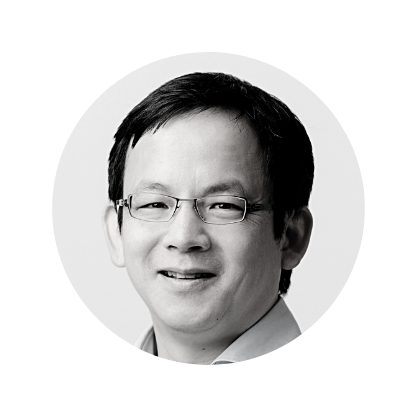
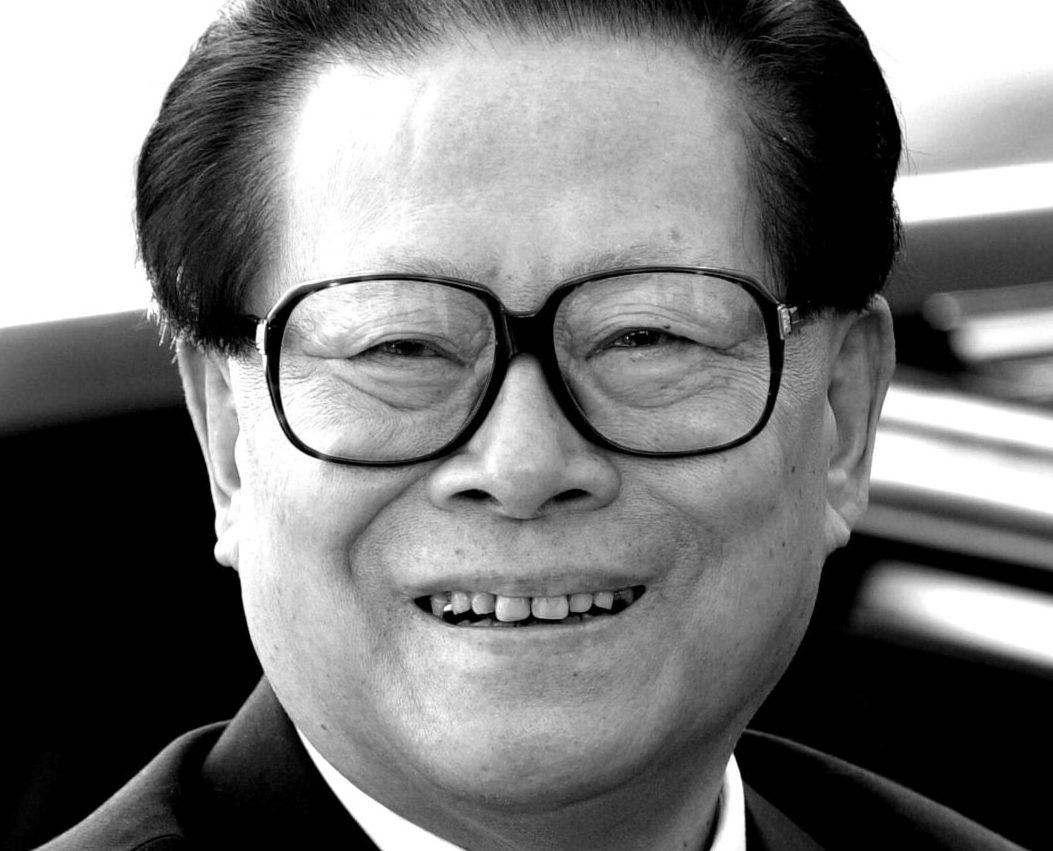
Jiang Zemin (江澤民) has passed away. As reported by state news agency Xinhua on Wednesday, the former Chinese state and party leader died of multiple organ failure due to leukemia at the age of 96 in Shanghai. Jiang served as General Secretary of the Communist Party from 1989 to 2002. A CP statement said, “Comrade Jiang Zemin’s death is an inestimable loss to our party, our military and our people.” And, “Comrade Jiang Zemin is immortal!”
Yet Jiang’s achievements are often underrated. In the history books, he is usually given only a small spot among the sheer larger-than-life leaders like Mao Zedong, Deng Xiaoping, and now Xi Jinping. Wrongly so.
When Jiang was named General Secretary of the CP in the summer of 1989, China was an outsider in the international community. The leadership had just brutally suppressed the student and worker protests in Tiananmen Square. The spirit of optimism of the reform and opening-up policy is gone. It seems as if China once again disappears under the iron fist of autocracy.
Then Jiang takes power and makes things right again. During his time in office as President of the People’s Republic in March 2003, China joined the World Trade Organization (WTO), reclaimed Hong Kong and Macau, secured the hosting of the 2008 Olympics, and became the country with the world’s highest economic growth. Jiang’s pragmatism turned out to be a stroke of luck for China.
Jiang was born in Yangzhou (Jiangsu) on August 17, 1926, to a farmer woman and an electrician. After his uncle was killed in the war against Japan, following Chinese tradition, Jiang was sent to live with his uncle’s widow and grew up there as the new patriarch of the family. In this way, he unexpectedly became the ‘son of a martyr’.
In Shanghai, Jiang studied electrical engineering and joined the Communist Party in 1946 – although at first without showing excessive political zeal. He slowly worked his way up the ranks before making the leap to the CP Politburo as mayor and later party leader of Shanghai. However, Shanghai’s economic success was attributed primarily to Mayor Zhu Rongji at the time. Jiang, on the other hand, stood out during the days of local student protests in 1986 by avoiding violence. The students did not receive severe punishments after the protests.
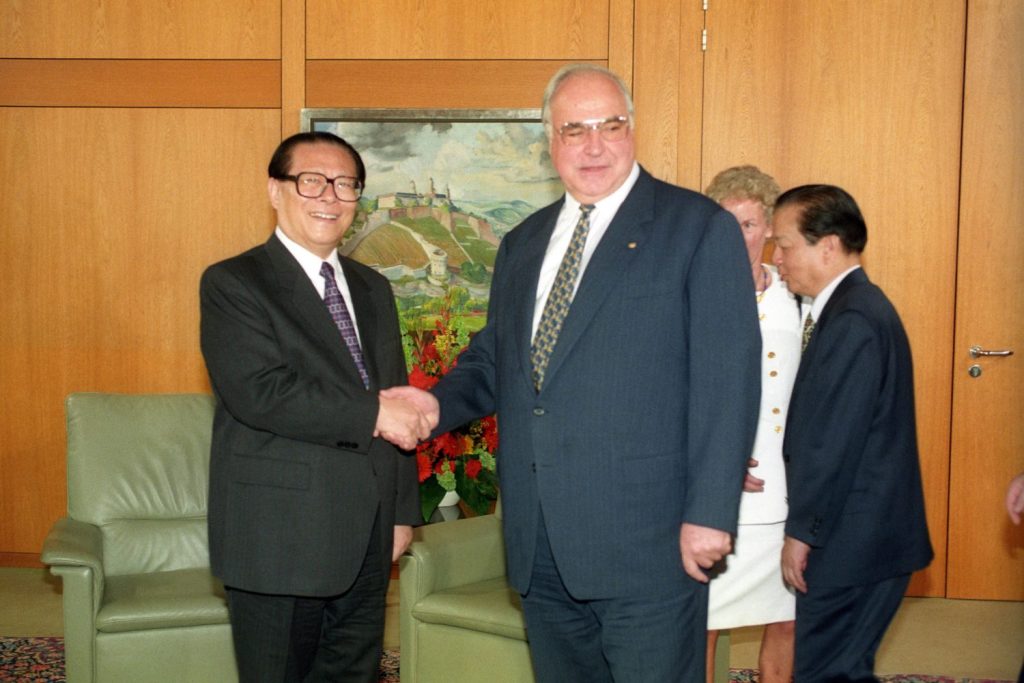
Jiang’s supposed love for peace even had an impact on the TV program, when he unceremoniously had an overly trigger-happy US police show canceled. Incidentally, he chose the German show “Derrick” as a replacement – after all, the show’s chief inspector stood out by using his brains instead of his gun and brawn. But the world continued to underestimate Jiang. Some even compared him to a flower pot: A lot of decoration, but little action.
What appears rather disrespectful probably made Jiang’s final ascent to the top of the state possible in the first place: In the summer of 1989, the CP leadership was so deeply divided that a compromise candidate was sought to succeed the ousted General Secretary Zhao Ziyang. The choice fell on Jiang Zemin. He was considered a transitional figure, a candidate on which all competing factions could agree. Their hope: a lot of decoration.
Jiang Zemin followed the motto “strong on two fronts”. For the economy, he adhered to Deng’s reforms; for politics, on the other hand, he focused on stability. Under Jiang Zemin, an authoritarian, self-confident and, above all, successful China emerged. Economically, the country experienced staggering growth under Jiang. Jiang proclaimed the “socialist market economy” and initiated the “Great Development of Western China” (西部大开发). Later, he also devised the idea of “Three Represents” (三个代表), which he used to open up the Communist Party to private entrepreneurs, among others.
He also turned around China’s foreign policy and led it out of international isolation: Jiang’s most notable state visits abroad certainly include his trips to the United States, where he met with Bill Clinton to discuss human rights, the situation in Tibet and China’s future development. Or his visit to Germany, which decisively advanced the expansion of economic relations.
But as liberal and open as Jiang presented himself abroad, he fought his rivals and critical voices at home with an authoritarian fist: In large-scale campaigns, more than 350,000 people were arrested within a year, and more than 4,000 were executed. In 1999, the Falun Gong movement was outlawed, and over the years Jiang also severely restricted freedom of the press.
The decorative temporary solution Jiang became a powerful stabilizer. “It turned out that he was indeed a good mediator, but also a good manipulator,” said James Lilley, the US ambassador to China at the time. Over the years, Jiang managed to establish an extensive network of relationships, contacts and dependencies. The so-called Shanghai faction would secure him far-reaching influence – even after he stepped down as president in 2003. He still often pulled the strings from behind the scenes until shortly before his death.
However, one person who was not one of Jiang’s followers was Xi Jinping – on the contrary. Rumors repeatedly circulated that veteran party officials were highly critical of Xi and his leadership. Xi suspected Jiang Zemin of being the mastermind behind this. He even believed that the explosion at the port of Tianjin in 2015 was a conspiracy led by Jiang Zemin. And so Xi set out to force Jiang’s henchmen out of their posts.
Above all Jiang’s unpretentious manner makes him seem today like a statesman from a bygone age: A man of the people: He danced waltzes, sang Elvis Presley’s “Love me tender” or strummed the Hawaiian ukulele.
And indeed, it seems as if many Chinese would wish for such a man back, especially in recent days. On Wednesday, criticism of Xi was repeatedly mixed in with the mourning for Jiang: On the popular messenger service WeChat, the song “It’s a shame it’s not you” was often shared. The message between the lines was that it was not Jiang who should have passed away, but someone else.
Nevertheless, it seems a bit far-fetched to draw a historical parallel to 1989, when the death of party leader Hu Yaobang, who had been demoted two years earlier, triggered the great wave of protests. Hu had a reputation for being a charismatic reformer, while Jiang Zemin was above all an underestimated string-puller who kept a low profile in recent times. However, Jiang’s death could well inspire people in China to take a critical look at the differences between Jiang’s China and the country under Xi Jinping.
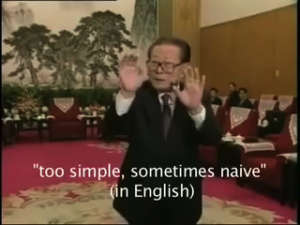
In China’s social media world, Jiang Zemin has gained cult status in recent years. Thousands of stickers, GIFs, and memes featuring the former head of state circulate on WeChat and other channels: Jiang yawning, grinning mischievously, playing the flute like a pied piper, or detonating a nuclear bomb with a mere point of his finger. Even the most ridiculous ones are not censored, on the contrary. In China, Jiang Zemin is an important part of pop culture.
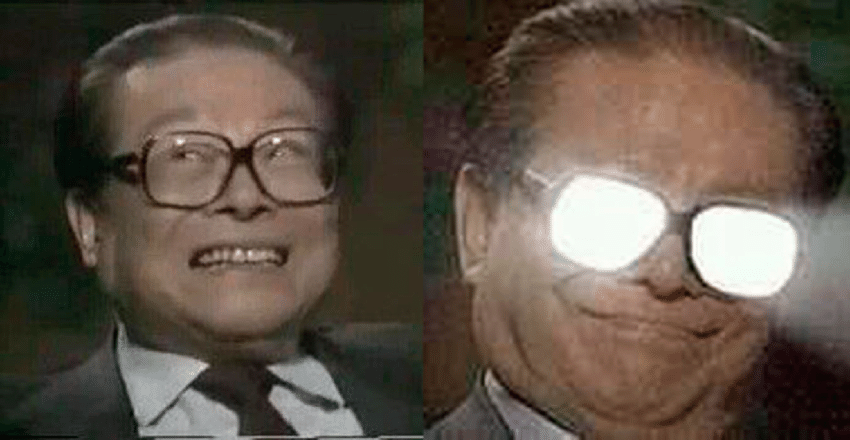
The two nicknames that mainly young Internet users have given him alternate between admiration and affectionate mockery: Jiang Zemin, “the elder” 长者, or, because of supposed outward similarities, simply 蛤, “the toad“. There is even a name for the worship of Jiang on China’s Internet: 膜蛤 – “toad worship“. Toad fans 蛤丝 or toad magicians “膜法师”, as they also call themselves, are considered an elite group: They are patriotic, well versed in the People’s Republic’s recent history and foreign policy. At the same time, they are not blind followers of the party. The comical exaggeration of Jiang Zemin could thus also be seen as an ironic break with the political personality cult that is experiencing a renaissance under Xi Jinping.
Jiang’s political legacy does not play a big role in toad worship. For the predominantly young fans, who at best experienced his reign as children, Jiang’s sometimes gruff and sometimes jovial style rather evokes a diffuse nostalgia of a somehow more relaxed China. Jiang is the stalwart grandpa, who comments on the food at the spring festival without batting an eye and with dry humor, or bursts out laughing when the granddaughter shows off her new hairstyle.
In reality, Jiang never shied away from making a grand appearance. He was not afraid to improvise before the eyes of the world. On a trip to the US in 1997, he played “Aloha Hawaii” on a local instrument in Honolulu. During a state visit to France in 1999, he took a chance and danced with then-first lady Bernadette Chirac.
Unlike Jiang, Xi Jinping’s every public appearance today is scripted down to the smallest detail. The last thing China’s strongman wants is to be publicly put on the spot, as Jonny Erling aptly wrote in his column on China.Table a few weeks ago. Therefore, Jiang’s successors can only appear dull in the eyes of Jiang’s admirers. If Jiang Zemin had been led out of the CP Congress this year with as little dignity as Hu, the outcry in China would certainly have been much greater.
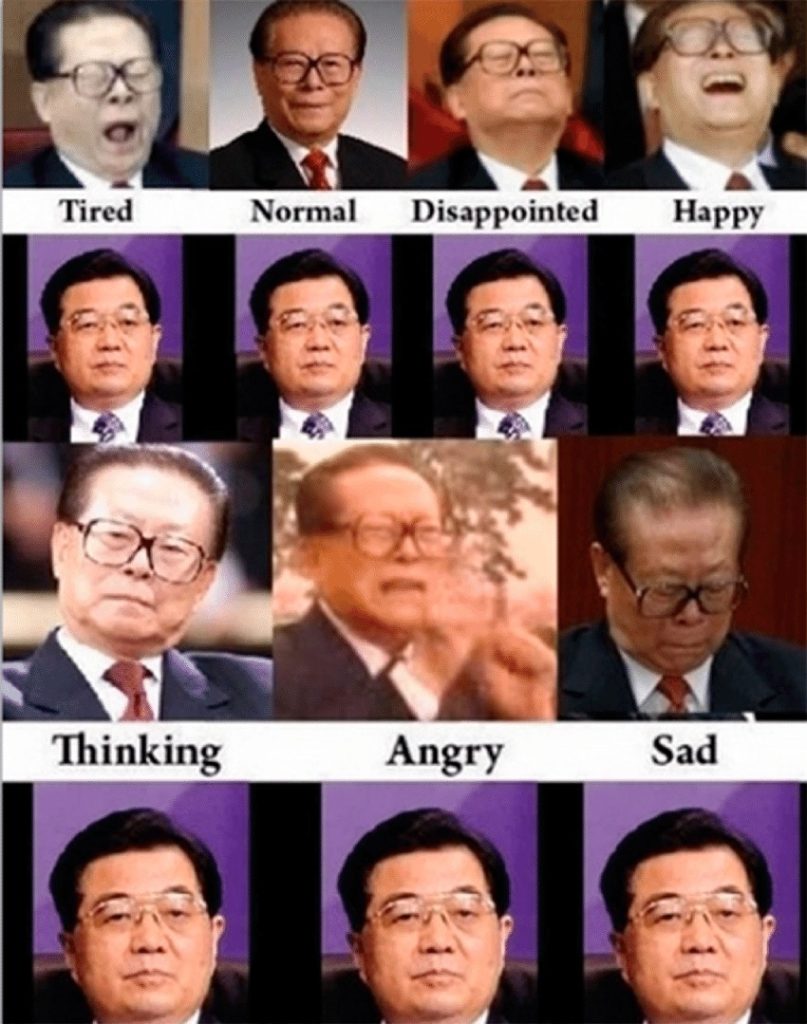
For his fans, Jiang also represented a certain cosmopolitanism that has been lost under his successors. The widely traveled state leader gave interviews to foreign journalists, sometimes even in English. In an interview with US star reporter Mike Wallace in 2000, for example, Jiang quoted Abraham Lincoln’s Gettysburg Address. Overall, Jiang’s self-confident way of dealing with the press is admired in China. He once dismissed renowned Hong Kong journalist Sharon Cheung in English, saying that the press in the former crown colony was “too young, too simple, sometimes naive.” This phrase has become a common way of discrediting someone, and not just among toad admirers.
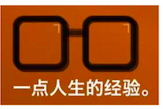
Now, following his death on Wednesday, the Chinese mourn as expected by posting memes. One shows the deceased’s square glasses, and below is a popular quote used in messengers when giving friends some advice: 一点人生的经验 – “A little bit of life experience“.
In the debate about the West’s dependence on China and forced labor in the production of solar technology, the People’s Republic is now adopting a dual strategy: The country is apparently building a second supply chain free of polysilicon from Xinjiang. With this strategy, Beijing, which dominates the global market for solar technology, wants to circumvent pressing questions about human rights when selling its products in Europe and the USA.
Some Chinese solar companies are adapting to the needs of the West and manufacturing “Xinjiang-free” products, says Johannes Bernreuter, a polysilicon expert with the consulting firm Bernreuter Research. The production chain can be “tracked and documented from the delivered polysilicon to the finished solar module,” the supply chain expert said. Jenny Chase, an expert at the think tank BloombergNEF, also confirms: The origin of polysilicon that does not come from the problematic Xinjiang province can be traced by certification companies.
This allows for easily dividing material flows: Xinjiang-free products are manufactured for export. Solar modules, whose feedstock might have been produced with forced labor, continue to be installed in China due to high domestic demand. Western sanctions and boycotts of polysilicon from Xinjiang would thus have little effect on Uyghur forced labor.
The development shows the close mutual dependence of China and, above all, the Western industrialized countries: On the one hand, three-quarters of all solar products come from the People’s Republic. They are needed for the global energy transition and compliance with climate targets. On the other hand, pressure is rising in the West for more independence from China and supply chains free of human rights violations – to which China in turn is responding.
However, it is unclear whether these dual supply chains are realistic down to the last detail. For example, the supply chains for metallurgical silicon, the starting material for polysilicon, are not transparent. Importers can hardly guarantee that no forced labor is used for it. “Of the seven Chinese polysilicon producers among the world’s top ten, six obtain significant quantities of metallurgical silicon from Xinjiang,” says Bernreuter.
Chinese manufacturers already circumvent US import tariffs and human rights regulations by relocating: They increase their investments in countries such as Vietnam and Malaysia. The first companies no longer buy raw materials in China, Bernreuter says. So Xinjiang-free supply chains are possible. What remains is the dependence on China: In case of a conflict, Chinese companies in Vietnam or Malaysia could also threaten to stop their exports to the West.
Like other industrialized countries, the German government is in a predicament. It wants to massively expand renewables to achieve its climate targets, while simultaneously wanting to reduce its dependency on China.
But China dominates the global market in all important production steps. The People’s Republic holds a market share (2021) of:
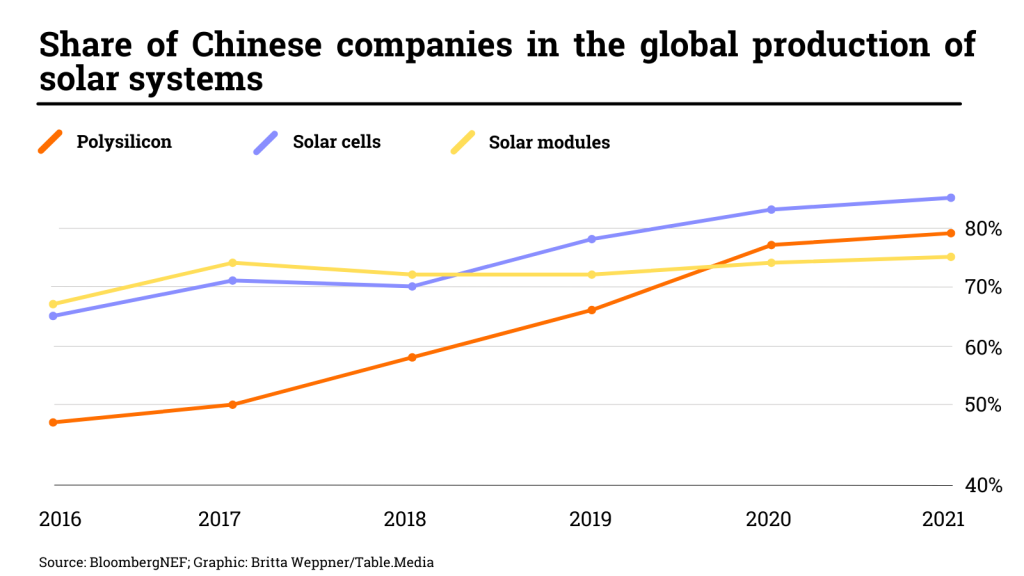
The share could grow to 95 percent for polysilicon, solar ingots (blocks of semiconductor material from which wafers are cut) and wafers, according to the latest World Energy Outlook. Overall, China accounts for three-quarters of the global solar trade.
The picture for European imports is correspondingly clear. 90 percent of EU imports of solar modules are from China. Since the Russian attack on Ukraine, imports have doubled.
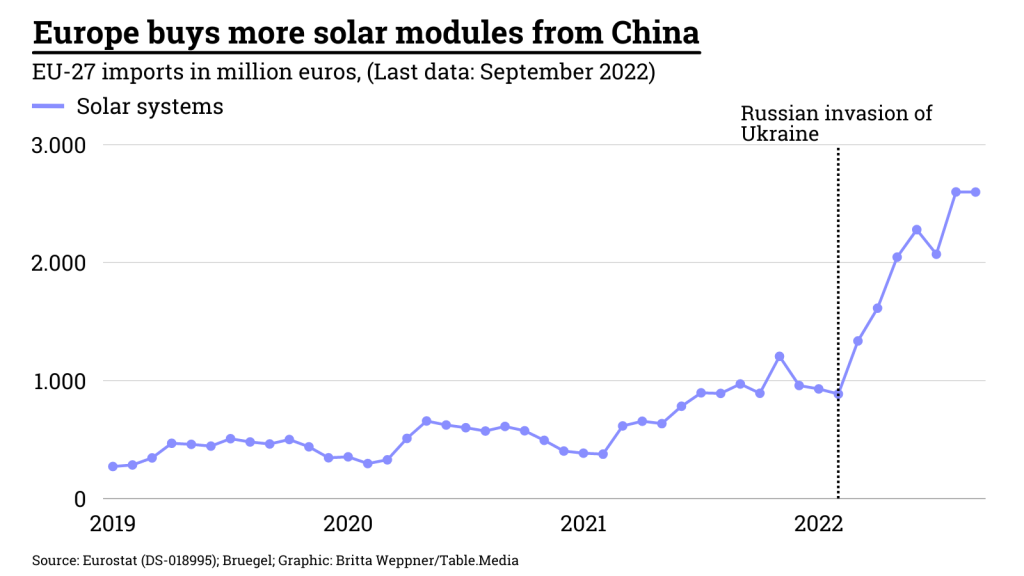
In a recently leaked draft of the German Foreign Office’s China strategy, China is referred to as a “competitor in the green transformation.” Because of China’s “strong to dominant position” in the solar sector, for example, “one-sided dependencies could arise“. The goal is to reduce these “dependencies (…) under the aspect of risk minimization”.
Because of the forced labor issue, the Foreign Office is “also prepared within the EU framework to support import stops from regions with particularly massive human rights violations if supply chains free of human rights violations cannot be ensured by other means,” the draft states.
The USA is already one step ahead. It has already imposed an import ban and passed the Uyghur Forced Labor Prevention Act. The law reverses the burden of proof:
By the end of the year, US solar imports with a capacity of up to twelve gigawatts could be affected. But according to Jenny Chase of the think tank BloombergNEF, this “won’t slow down solar expansion much” in the US.
German Economy and Climate Minister Robert Habeck apparently recognized the sensitivity of the development. He plans to promote the mass production of solar modules and wind turbines in the EU with a “European platform for transformation technologies” (Europe.Table reported).
In a special session of the German Bundestag, members of various parties expressed their respect for the protesters in China.
“Their courage is an example to us, we bow before them,” said liberal FDP foreign policy expert Alexander Graf Lambsdorff, paying his respects to the protesters against the repressive zero-Covid policy. For the social democratic SPD, Dagmar Schmidt expressed hope for “a peaceful handling” of the protests by the Chinese leadership and “for more freedom for the people in China.” “The power of freedom will sooner or later prevail in China,” SPD foreign policy expert Nils Schmid said. Christian Democratic Union (CDU) foreign policy expert Johann Wadephul also spoke of “remarkable protests.”
On behalf of the German government, Minister of State Tobias Lindner (Greens) of the Foreign Ministry called for further cooperation with China, but on a rules-based order and “in line with our values.” He said there would have to be further cooperation in various areas, such as climate protection. At the same time, however, the German government stands “in solidarity with all people who want to exercise their right to freedom of expression, in China and worldwide”. flee
Police clashed with protesters in the southern metropolis of Guangzhou on Wednesday morning. The angry crowd threw metal bars at the police officers, most of whom were dressed in white protective suits.
During Wednesday, the city government responded with a series of relaxations of Covid measures. Citizens’ lives should be disrupted as little as possible in the future, the health commission assured. Contacts of infected people should be able to spend their quarantine at home, Guangzhou health commission Deputy Director Zhang Yi said. The city downgraded numerous districts to “low risk.” Guangzhou has a population of 19 million.
In November, the central government already announced a “more focused approach” in the fight against Covid. Protests against the measures in around 20 cities from Friday to Monday currently put the government under considerable pressure to relax the contact restrictions even further. At the same time, infection figures continue to rise. fin
In light of the lockdowns in the wake of the rising Covid numbers and the recent protests against the measures, the mood in the Chinese economy has deteriorated even further. The official Purchasing Managers’ Indexes (PMI) for services and industry were even worse than expected in November. The sentiment indicator for the industrial sector fell from 49.2 points in October to just 48 points in November, the statistics office in Beijing announced on Wednesday. This is the weakest value since April. Analysts previously had expected 49 points.
Values below the 50-point mark for the key economic barometers point to a decline in growth momentum. The services barometer fell from 48.7 to just 46.7 points in November. Economists had expected 48 points. The overall index also dropped sharply from 49.0 points to 47.1.
Experts believe that the Chinese central bank will adopt further stimulus measures in the coming months – especially since the Chinese leadership intends to stick to zero-Covid. However, Zhang Zhiwei, chief economist at Pinpoint Asset Management, expects that momentum will probably continue to weaken in December as well as in the first quarter.
The International Monetary Fund (IMF) also warned of risks given the government’s rigorous stance. The Fund may have to revise its forecast for China’s economic growth downward, IMF Chief Kristalina Georgieva said in Berlin on Tuesday. She also pointed to the problems in the real estate sector. Beijing has room to boost the economy to resist downward pressure, Georgieva added. The IMF has predicted China will grow 3.2 percent this year and 4.4 percent next year. flee/rtr
Two Chinese and six Russian fighter jets have entered South Korea’s air defense identification zone, according to information from Seoul. In response, South Korea ordered its own jets to take off, the military staff in Seoul said Wednesday. However, South Korea’s actual airspace was reportedly not violated. According to the information, Chinese H-6 bombers first repeatedly penetrated the Korean Air Defense Zone (KADIZ) in the early morning. This zone supplements South Korea’s airspace as a kind of buffer zone. A few hours later, they were then escorted by Russian jets, including TU-95 bombers and SU-35 fighter jets. Similarly, Chinese fighter jets also repeatedly penetrated Taiwan’s air defense zone recently.
At the meeting of foreign ministers from NATO members, countries such as the Czech Republic, Norway and Sweden called for greater caution toward China. Luxembourg’s Foreign Minister Jean Asselborn warned of a “new dependency”, for example on rare earth elements or electronic chips. The military alliance must also press China to “avoid a catastrophe when it comes to nuclear weapons” in Russia’s war of aggression, Asselborn said on Wednesday. NATO Chief Jens Stoltenberg also warned that the war in Ukraine revealed dangerous dependence on Russian gas. “This should also lead us to assess our dependencies on other authoritarian regimes, not least China, for our supply chains, technology, or infrastructure.”
Growing concern about the People’s Republic’s military capabilities was also revealed in a recent US report: China’s nuclear arsenal is expected to more than triple by 2035. The US Defense Department report, released on Tuesday, states that China now possesses more than 400 nuclear warheads. “If China continues the pace of its nuclear expansion, it will likely field a stockpile of about 1,500 warheads (by 2035),” the paper said.
China reportedly continues to modernize its ballistic missiles, which could carry nuclear warheads. The People’s Republic test-fired some 135 ballistic missiles last year – “more than the rest of the world combined.” This statistic excludes missiles fired during armed conflicts, such as in Ukraine. Pentagon spokesman Pat Ryder warned on Tuesday that a buildup of China’s nuclear arsenal would lead to growing instability. “The more proliferation there is, the more concerning it is, the more destabilizing to the region it is,” Ryder said. rtr/ari
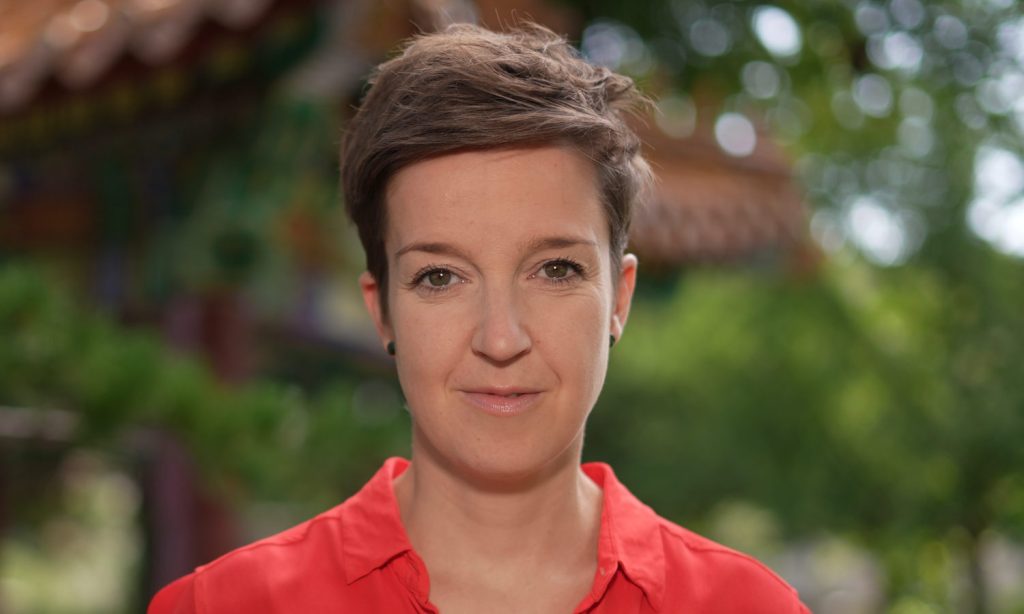
“Beijing is certainly not the easiest place to be, but it is the most exciting place I can imagine as a journalist right now,” says Miriam Steimer. A few months ago she went to China as a correspondent for the German public broadcaster ZDF, and since October she has been head of the ZDF East Asia studio in Beijing. But Steimer originally had completely different plans.
“Actually, I wanted to work in Paris,” she says. “However, when the opportunity to go to Beijing opened up, it tempted me.” Steimer thought it over thoroughly and finally courageously applied.
The fact that it would be exciting but not easy in China was already apparent on arrival: As soon as she landed, she went straight into a two-week hotel quarantine. “All the Chinese people I met in the first two weeks were wearing white full-body protective suits. That’s quite an unusual start in a new country.”
Steimer now also faces new career challenges: It’s the first time she’s worked as a journalist under a dictatorship – a dictatorship that defines journalism entirely differently than Steimer does. “I find it particularly difficult to have to ‘think along’ with so many things. For example, what the consequences might be for interview partners when they talk to us.”
Steimer has been working for ZDF since her education in journalism. During her career, she worked for numerous news programs of the ZDF network. “I have a reporter’s heart,” Steimer says. “My favorite thing is to be out and about in the country, talking to people, learning about new realities and asking lots and lots of questions.”
This curiosity has now also led her to China – a country Steimer has had little contact with so far. “It’s a new field that fascinates me every day,” she says. “China shows itself differently all the time, depending on which corner of the country we are traveling in – as complicated as that is right now due to the government’s zero-Covid policy.”
If you ask Steimer whether she has already adjusted to life in Beijing, she has to differentiate. “In terms of work, it went quickly,” she says. Taiwan, Covid, heat wave, CP conference, Scholz visit – there was a lot to do right away. “Privately, though, I’m still a little behind.” Arriving under special circumstances takes time. Svenja Napp
Miriam Kunze heads a department for battery cell development at Volkswagen in Hefei. She previously worked on anode technology in Salzgitter. Before that, the trained chemist worked for Continental.
Lindsay Chu will be the new CEO of DBS Asia Capital and Head of the investment department for China and Hong Kong. Chu joins from Nomura. At DBS, he succeeds Anuruk Karoonyavanich.
Is something changing in your organization? Why not let us know at heads@table.media!

The three taikonauts Fei Junlong, Deng Qingming and Zhang Lu arrived at the space station “Tiangong” on Wednesday. They docked with the “Shenzhou-15” at the space station and are now expected to spend about a week together with their three colleagues, who have already been living and working at the station for half a year and are now being relieved. The six-month mission of the “Shenzhou-15” is to be the last in the construction phase of the “Heavenly Palace”.
It was November 12, 1978, early in the morning, in front of the VW high-rise in Wolfsburg. 14 men from the People’s Republic stood at the entrance. They seemed a bit lost. And in their badly fitting suits, they did not look like government representatives of the world’s most populous nation.
One of them handed the VW representatives a sheet with the names of the delegation members and their functions. There were no telephone numbers on it. Later, one of the delegation members confessed that there was no way to print business cards in all of Beijing in time for departure. That is how backward China was at the time.
A somewhat gaunt delegation member from the third row introduced himself as the Director of the Foreign Affairs Department in the Ministry of Engineering. Other than that, he spoke little. Only his oversized glasses stood out at the time. The name of the cadre: Jiang Zemin. 15 years later, he became President of the People’s Republic. His visit to Wolfsburg in 1978 left a lasting impression on him. Under his tenure as head of state, Volkswagen rose to become the undisputed number one on China’s car market. Now Jiang has passed away at the age of 96. Michael Radunski has written his obituary. And Fabian Peltsch looks at Jiang Zemin’s impact on today’s pop culture.


Jiang Zemin (江澤民) has passed away. As reported by state news agency Xinhua on Wednesday, the former Chinese state and party leader died of multiple organ failure due to leukemia at the age of 96 in Shanghai. Jiang served as General Secretary of the Communist Party from 1989 to 2002. A CP statement said, “Comrade Jiang Zemin’s death is an inestimable loss to our party, our military and our people.” And, “Comrade Jiang Zemin is immortal!”
Yet Jiang’s achievements are often underrated. In the history books, he is usually given only a small spot among the sheer larger-than-life leaders like Mao Zedong, Deng Xiaoping, and now Xi Jinping. Wrongly so.
When Jiang was named General Secretary of the CP in the summer of 1989, China was an outsider in the international community. The leadership had just brutally suppressed the student and worker protests in Tiananmen Square. The spirit of optimism of the reform and opening-up policy is gone. It seems as if China once again disappears under the iron fist of autocracy.
Then Jiang takes power and makes things right again. During his time in office as President of the People’s Republic in March 2003, China joined the World Trade Organization (WTO), reclaimed Hong Kong and Macau, secured the hosting of the 2008 Olympics, and became the country with the world’s highest economic growth. Jiang’s pragmatism turned out to be a stroke of luck for China.
Jiang was born in Yangzhou (Jiangsu) on August 17, 1926, to a farmer woman and an electrician. After his uncle was killed in the war against Japan, following Chinese tradition, Jiang was sent to live with his uncle’s widow and grew up there as the new patriarch of the family. In this way, he unexpectedly became the ‘son of a martyr’.
In Shanghai, Jiang studied electrical engineering and joined the Communist Party in 1946 – although at first without showing excessive political zeal. He slowly worked his way up the ranks before making the leap to the CP Politburo as mayor and later party leader of Shanghai. However, Shanghai’s economic success was attributed primarily to Mayor Zhu Rongji at the time. Jiang, on the other hand, stood out during the days of local student protests in 1986 by avoiding violence. The students did not receive severe punishments after the protests.

Jiang’s supposed love for peace even had an impact on the TV program, when he unceremoniously had an overly trigger-happy US police show canceled. Incidentally, he chose the German show “Derrick” as a replacement – after all, the show’s chief inspector stood out by using his brains instead of his gun and brawn. But the world continued to underestimate Jiang. Some even compared him to a flower pot: A lot of decoration, but little action.
What appears rather disrespectful probably made Jiang’s final ascent to the top of the state possible in the first place: In the summer of 1989, the CP leadership was so deeply divided that a compromise candidate was sought to succeed the ousted General Secretary Zhao Ziyang. The choice fell on Jiang Zemin. He was considered a transitional figure, a candidate on which all competing factions could agree. Their hope: a lot of decoration.
Jiang Zemin followed the motto “strong on two fronts”. For the economy, he adhered to Deng’s reforms; for politics, on the other hand, he focused on stability. Under Jiang Zemin, an authoritarian, self-confident and, above all, successful China emerged. Economically, the country experienced staggering growth under Jiang. Jiang proclaimed the “socialist market economy” and initiated the “Great Development of Western China” (西部大开发). Later, he also devised the idea of “Three Represents” (三个代表), which he used to open up the Communist Party to private entrepreneurs, among others.
He also turned around China’s foreign policy and led it out of international isolation: Jiang’s most notable state visits abroad certainly include his trips to the United States, where he met with Bill Clinton to discuss human rights, the situation in Tibet and China’s future development. Or his visit to Germany, which decisively advanced the expansion of economic relations.
But as liberal and open as Jiang presented himself abroad, he fought his rivals and critical voices at home with an authoritarian fist: In large-scale campaigns, more than 350,000 people were arrested within a year, and more than 4,000 were executed. In 1999, the Falun Gong movement was outlawed, and over the years Jiang also severely restricted freedom of the press.
The decorative temporary solution Jiang became a powerful stabilizer. “It turned out that he was indeed a good mediator, but also a good manipulator,” said James Lilley, the US ambassador to China at the time. Over the years, Jiang managed to establish an extensive network of relationships, contacts and dependencies. The so-called Shanghai faction would secure him far-reaching influence – even after he stepped down as president in 2003. He still often pulled the strings from behind the scenes until shortly before his death.
However, one person who was not one of Jiang’s followers was Xi Jinping – on the contrary. Rumors repeatedly circulated that veteran party officials were highly critical of Xi and his leadership. Xi suspected Jiang Zemin of being the mastermind behind this. He even believed that the explosion at the port of Tianjin in 2015 was a conspiracy led by Jiang Zemin. And so Xi set out to force Jiang’s henchmen out of their posts.
Above all Jiang’s unpretentious manner makes him seem today like a statesman from a bygone age: A man of the people: He danced waltzes, sang Elvis Presley’s “Love me tender” or strummed the Hawaiian ukulele.
And indeed, it seems as if many Chinese would wish for such a man back, especially in recent days. On Wednesday, criticism of Xi was repeatedly mixed in with the mourning for Jiang: On the popular messenger service WeChat, the song “It’s a shame it’s not you” was often shared. The message between the lines was that it was not Jiang who should have passed away, but someone else.
Nevertheless, it seems a bit far-fetched to draw a historical parallel to 1989, when the death of party leader Hu Yaobang, who had been demoted two years earlier, triggered the great wave of protests. Hu had a reputation for being a charismatic reformer, while Jiang Zemin was above all an underestimated string-puller who kept a low profile in recent times. However, Jiang’s death could well inspire people in China to take a critical look at the differences between Jiang’s China and the country under Xi Jinping.

In China’s social media world, Jiang Zemin has gained cult status in recent years. Thousands of stickers, GIFs, and memes featuring the former head of state circulate on WeChat and other channels: Jiang yawning, grinning mischievously, playing the flute like a pied piper, or detonating a nuclear bomb with a mere point of his finger. Even the most ridiculous ones are not censored, on the contrary. In China, Jiang Zemin is an important part of pop culture.

The two nicknames that mainly young Internet users have given him alternate between admiration and affectionate mockery: Jiang Zemin, “the elder” 长者, or, because of supposed outward similarities, simply 蛤, “the toad“. There is even a name for the worship of Jiang on China’s Internet: 膜蛤 – “toad worship“. Toad fans 蛤丝 or toad magicians “膜法师”, as they also call themselves, are considered an elite group: They are patriotic, well versed in the People’s Republic’s recent history and foreign policy. At the same time, they are not blind followers of the party. The comical exaggeration of Jiang Zemin could thus also be seen as an ironic break with the political personality cult that is experiencing a renaissance under Xi Jinping.
Jiang’s political legacy does not play a big role in toad worship. For the predominantly young fans, who at best experienced his reign as children, Jiang’s sometimes gruff and sometimes jovial style rather evokes a diffuse nostalgia of a somehow more relaxed China. Jiang is the stalwart grandpa, who comments on the food at the spring festival without batting an eye and with dry humor, or bursts out laughing when the granddaughter shows off her new hairstyle.
In reality, Jiang never shied away from making a grand appearance. He was not afraid to improvise before the eyes of the world. On a trip to the US in 1997, he played “Aloha Hawaii” on a local instrument in Honolulu. During a state visit to France in 1999, he took a chance and danced with then-first lady Bernadette Chirac.
Unlike Jiang, Xi Jinping’s every public appearance today is scripted down to the smallest detail. The last thing China’s strongman wants is to be publicly put on the spot, as Jonny Erling aptly wrote in his column on China.Table a few weeks ago. Therefore, Jiang’s successors can only appear dull in the eyes of Jiang’s admirers. If Jiang Zemin had been led out of the CP Congress this year with as little dignity as Hu, the outcry in China would certainly have been much greater.

For his fans, Jiang also represented a certain cosmopolitanism that has been lost under his successors. The widely traveled state leader gave interviews to foreign journalists, sometimes even in English. In an interview with US star reporter Mike Wallace in 2000, for example, Jiang quoted Abraham Lincoln’s Gettysburg Address. Overall, Jiang’s self-confident way of dealing with the press is admired in China. He once dismissed renowned Hong Kong journalist Sharon Cheung in English, saying that the press in the former crown colony was “too young, too simple, sometimes naive.” This phrase has become a common way of discrediting someone, and not just among toad admirers.

Now, following his death on Wednesday, the Chinese mourn as expected by posting memes. One shows the deceased’s square glasses, and below is a popular quote used in messengers when giving friends some advice: 一点人生的经验 – “A little bit of life experience“.
In the debate about the West’s dependence on China and forced labor in the production of solar technology, the People’s Republic is now adopting a dual strategy: The country is apparently building a second supply chain free of polysilicon from Xinjiang. With this strategy, Beijing, which dominates the global market for solar technology, wants to circumvent pressing questions about human rights when selling its products in Europe and the USA.
Some Chinese solar companies are adapting to the needs of the West and manufacturing “Xinjiang-free” products, says Johannes Bernreuter, a polysilicon expert with the consulting firm Bernreuter Research. The production chain can be “tracked and documented from the delivered polysilicon to the finished solar module,” the supply chain expert said. Jenny Chase, an expert at the think tank BloombergNEF, also confirms: The origin of polysilicon that does not come from the problematic Xinjiang province can be traced by certification companies.
This allows for easily dividing material flows: Xinjiang-free products are manufactured for export. Solar modules, whose feedstock might have been produced with forced labor, continue to be installed in China due to high domestic demand. Western sanctions and boycotts of polysilicon from Xinjiang would thus have little effect on Uyghur forced labor.
The development shows the close mutual dependence of China and, above all, the Western industrialized countries: On the one hand, three-quarters of all solar products come from the People’s Republic. They are needed for the global energy transition and compliance with climate targets. On the other hand, pressure is rising in the West for more independence from China and supply chains free of human rights violations – to which China in turn is responding.
However, it is unclear whether these dual supply chains are realistic down to the last detail. For example, the supply chains for metallurgical silicon, the starting material for polysilicon, are not transparent. Importers can hardly guarantee that no forced labor is used for it. “Of the seven Chinese polysilicon producers among the world’s top ten, six obtain significant quantities of metallurgical silicon from Xinjiang,” says Bernreuter.
Chinese manufacturers already circumvent US import tariffs and human rights regulations by relocating: They increase their investments in countries such as Vietnam and Malaysia. The first companies no longer buy raw materials in China, Bernreuter says. So Xinjiang-free supply chains are possible. What remains is the dependence on China: In case of a conflict, Chinese companies in Vietnam or Malaysia could also threaten to stop their exports to the West.
Like other industrialized countries, the German government is in a predicament. It wants to massively expand renewables to achieve its climate targets, while simultaneously wanting to reduce its dependency on China.
But China dominates the global market in all important production steps. The People’s Republic holds a market share (2021) of:

The share could grow to 95 percent for polysilicon, solar ingots (blocks of semiconductor material from which wafers are cut) and wafers, according to the latest World Energy Outlook. Overall, China accounts for three-quarters of the global solar trade.
The picture for European imports is correspondingly clear. 90 percent of EU imports of solar modules are from China. Since the Russian attack on Ukraine, imports have doubled.

In a recently leaked draft of the German Foreign Office’s China strategy, China is referred to as a “competitor in the green transformation.” Because of China’s “strong to dominant position” in the solar sector, for example, “one-sided dependencies could arise“. The goal is to reduce these “dependencies (…) under the aspect of risk minimization”.
Because of the forced labor issue, the Foreign Office is “also prepared within the EU framework to support import stops from regions with particularly massive human rights violations if supply chains free of human rights violations cannot be ensured by other means,” the draft states.
The USA is already one step ahead. It has already imposed an import ban and passed the Uyghur Forced Labor Prevention Act. The law reverses the burden of proof:
By the end of the year, US solar imports with a capacity of up to twelve gigawatts could be affected. But according to Jenny Chase of the think tank BloombergNEF, this “won’t slow down solar expansion much” in the US.
German Economy and Climate Minister Robert Habeck apparently recognized the sensitivity of the development. He plans to promote the mass production of solar modules and wind turbines in the EU with a “European platform for transformation technologies” (Europe.Table reported).
In a special session of the German Bundestag, members of various parties expressed their respect for the protesters in China.
“Their courage is an example to us, we bow before them,” said liberal FDP foreign policy expert Alexander Graf Lambsdorff, paying his respects to the protesters against the repressive zero-Covid policy. For the social democratic SPD, Dagmar Schmidt expressed hope for “a peaceful handling” of the protests by the Chinese leadership and “for more freedom for the people in China.” “The power of freedom will sooner or later prevail in China,” SPD foreign policy expert Nils Schmid said. Christian Democratic Union (CDU) foreign policy expert Johann Wadephul also spoke of “remarkable protests.”
On behalf of the German government, Minister of State Tobias Lindner (Greens) of the Foreign Ministry called for further cooperation with China, but on a rules-based order and “in line with our values.” He said there would have to be further cooperation in various areas, such as climate protection. At the same time, however, the German government stands “in solidarity with all people who want to exercise their right to freedom of expression, in China and worldwide”. flee
Police clashed with protesters in the southern metropolis of Guangzhou on Wednesday morning. The angry crowd threw metal bars at the police officers, most of whom were dressed in white protective suits.
During Wednesday, the city government responded with a series of relaxations of Covid measures. Citizens’ lives should be disrupted as little as possible in the future, the health commission assured. Contacts of infected people should be able to spend their quarantine at home, Guangzhou health commission Deputy Director Zhang Yi said. The city downgraded numerous districts to “low risk.” Guangzhou has a population of 19 million.
In November, the central government already announced a “more focused approach” in the fight against Covid. Protests against the measures in around 20 cities from Friday to Monday currently put the government under considerable pressure to relax the contact restrictions even further. At the same time, infection figures continue to rise. fin
In light of the lockdowns in the wake of the rising Covid numbers and the recent protests against the measures, the mood in the Chinese economy has deteriorated even further. The official Purchasing Managers’ Indexes (PMI) for services and industry were even worse than expected in November. The sentiment indicator for the industrial sector fell from 49.2 points in October to just 48 points in November, the statistics office in Beijing announced on Wednesday. This is the weakest value since April. Analysts previously had expected 49 points.
Values below the 50-point mark for the key economic barometers point to a decline in growth momentum. The services barometer fell from 48.7 to just 46.7 points in November. Economists had expected 48 points. The overall index also dropped sharply from 49.0 points to 47.1.
Experts believe that the Chinese central bank will adopt further stimulus measures in the coming months – especially since the Chinese leadership intends to stick to zero-Covid. However, Zhang Zhiwei, chief economist at Pinpoint Asset Management, expects that momentum will probably continue to weaken in December as well as in the first quarter.
The International Monetary Fund (IMF) also warned of risks given the government’s rigorous stance. The Fund may have to revise its forecast for China’s economic growth downward, IMF Chief Kristalina Georgieva said in Berlin on Tuesday. She also pointed to the problems in the real estate sector. Beijing has room to boost the economy to resist downward pressure, Georgieva added. The IMF has predicted China will grow 3.2 percent this year and 4.4 percent next year. flee/rtr
Two Chinese and six Russian fighter jets have entered South Korea’s air defense identification zone, according to information from Seoul. In response, South Korea ordered its own jets to take off, the military staff in Seoul said Wednesday. However, South Korea’s actual airspace was reportedly not violated. According to the information, Chinese H-6 bombers first repeatedly penetrated the Korean Air Defense Zone (KADIZ) in the early morning. This zone supplements South Korea’s airspace as a kind of buffer zone. A few hours later, they were then escorted by Russian jets, including TU-95 bombers and SU-35 fighter jets. Similarly, Chinese fighter jets also repeatedly penetrated Taiwan’s air defense zone recently.
At the meeting of foreign ministers from NATO members, countries such as the Czech Republic, Norway and Sweden called for greater caution toward China. Luxembourg’s Foreign Minister Jean Asselborn warned of a “new dependency”, for example on rare earth elements or electronic chips. The military alliance must also press China to “avoid a catastrophe when it comes to nuclear weapons” in Russia’s war of aggression, Asselborn said on Wednesday. NATO Chief Jens Stoltenberg also warned that the war in Ukraine revealed dangerous dependence on Russian gas. “This should also lead us to assess our dependencies on other authoritarian regimes, not least China, for our supply chains, technology, or infrastructure.”
Growing concern about the People’s Republic’s military capabilities was also revealed in a recent US report: China’s nuclear arsenal is expected to more than triple by 2035. The US Defense Department report, released on Tuesday, states that China now possesses more than 400 nuclear warheads. “If China continues the pace of its nuclear expansion, it will likely field a stockpile of about 1,500 warheads (by 2035),” the paper said.
China reportedly continues to modernize its ballistic missiles, which could carry nuclear warheads. The People’s Republic test-fired some 135 ballistic missiles last year – “more than the rest of the world combined.” This statistic excludes missiles fired during armed conflicts, such as in Ukraine. Pentagon spokesman Pat Ryder warned on Tuesday that a buildup of China’s nuclear arsenal would lead to growing instability. “The more proliferation there is, the more concerning it is, the more destabilizing to the region it is,” Ryder said. rtr/ari

“Beijing is certainly not the easiest place to be, but it is the most exciting place I can imagine as a journalist right now,” says Miriam Steimer. A few months ago she went to China as a correspondent for the German public broadcaster ZDF, and since October she has been head of the ZDF East Asia studio in Beijing. But Steimer originally had completely different plans.
“Actually, I wanted to work in Paris,” she says. “However, when the opportunity to go to Beijing opened up, it tempted me.” Steimer thought it over thoroughly and finally courageously applied.
The fact that it would be exciting but not easy in China was already apparent on arrival: As soon as she landed, she went straight into a two-week hotel quarantine. “All the Chinese people I met in the first two weeks were wearing white full-body protective suits. That’s quite an unusual start in a new country.”
Steimer now also faces new career challenges: It’s the first time she’s worked as a journalist under a dictatorship – a dictatorship that defines journalism entirely differently than Steimer does. “I find it particularly difficult to have to ‘think along’ with so many things. For example, what the consequences might be for interview partners when they talk to us.”
Steimer has been working for ZDF since her education in journalism. During her career, she worked for numerous news programs of the ZDF network. “I have a reporter’s heart,” Steimer says. “My favorite thing is to be out and about in the country, talking to people, learning about new realities and asking lots and lots of questions.”
This curiosity has now also led her to China – a country Steimer has had little contact with so far. “It’s a new field that fascinates me every day,” she says. “China shows itself differently all the time, depending on which corner of the country we are traveling in – as complicated as that is right now due to the government’s zero-Covid policy.”
If you ask Steimer whether she has already adjusted to life in Beijing, she has to differentiate. “In terms of work, it went quickly,” she says. Taiwan, Covid, heat wave, CP conference, Scholz visit – there was a lot to do right away. “Privately, though, I’m still a little behind.” Arriving under special circumstances takes time. Svenja Napp
Miriam Kunze heads a department for battery cell development at Volkswagen in Hefei. She previously worked on anode technology in Salzgitter. Before that, the trained chemist worked for Continental.
Lindsay Chu will be the new CEO of DBS Asia Capital and Head of the investment department for China and Hong Kong. Chu joins from Nomura. At DBS, he succeeds Anuruk Karoonyavanich.
Is something changing in your organization? Why not let us know at heads@table.media!

The three taikonauts Fei Junlong, Deng Qingming and Zhang Lu arrived at the space station “Tiangong” on Wednesday. They docked with the “Shenzhou-15” at the space station and are now expected to spend about a week together with their three colleagues, who have already been living and working at the station for half a year and are now being relieved. The six-month mission of the “Shenzhou-15” is to be the last in the construction phase of the “Heavenly Palace”.
